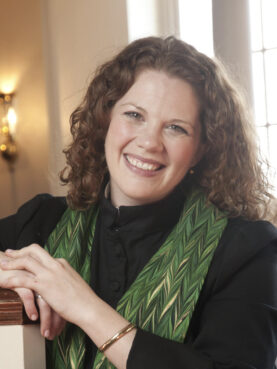Sports books also have an added advantage, said McGowan, in that they allow people to combine two things they like to do — gambling and cheering for their teams.
“When they bet,” he said, “people think they’re supporting the team that they’re betting on.”
Public approval of gambling has grown steadily in recent decades. In 2009, Gallup, which has measured public views on gambling and other moral issues since 2003, found that 58% of Americans said gambling was morally acceptable. In 2023, 70% of those surveyed said it was moral to gamble.
Legal sports gambling has become a lucrative business, according to a recent report from the American Gaming Association. Commercial sports betting companies took in $9.2 billion in revenue on more than $106 billion in bets from January to November of 2023.
The Rev. Laura Everett. (Photo courtesy Massachusetts Council of Churches)
The Rev. Laura Everett, executive director of the Massachusetts Council of Churches, said faith leaders who raise questions about the downsides of legalized gambling can feel like they are facing overwhelming odds. She worries that sports leagues have become too cozy with the gambling industry.
“The sports leagues — not only didn’t oppose this — they rolled over and said, ‘scratch my belly,’” she said.
Still, she said faith groups that don’t agree on all kinds of other issues can find common ground in raising concerns about the ubiquity of sports gambling. And they still can have a voice, she said.
For example, the state of Massachusetts is looking at allowing bars to install sports-betting kiosks, and faith leaders like Everett have been asked to give public feedback about their concerns.
She worries the human cost of expanding gambling is too high.
“Every time you expand gambling — there is a percentage of the population whose lives will be destroyed,” she said.
The National Council on Problem Gambling estimates that about 2 million Americans — or 1% of the population — have a severe gambling problem, with between 4 and 6 million having moderate or mild gambling problems.
John Litzler, director of public policy of the Christian Life Commission for the Baptist General Convention of Texas, said those with gambling addictions often show up at the door of churches or other faith groups when their lives fall apart.
Texas Baptists oppose making sports betting legal in their state — which, with California, remain the two largest untapped markets for the gaming industry. Legal Sports Report estimated that those states could generate half a billion dollars in bets on the Super Bowl alone.

(Image from Pixabay/Creative Commons)
Litzler agrees that opponents of expanded sports betting face a perception problem. Many people believe that sports betting is a harmless pastime, while a series of recent commercials from the gaming industry portray gambling as a way to give games more meaning and excitement.
When he talks to churches or legislators about gambling, Litzler stresses the potential for harm, especially in the use of betting apps. When people had to go to a casino to gamble, they had to be more intentional about what they were doing. And if they lost money, they would have time on the ride home to cool off.


